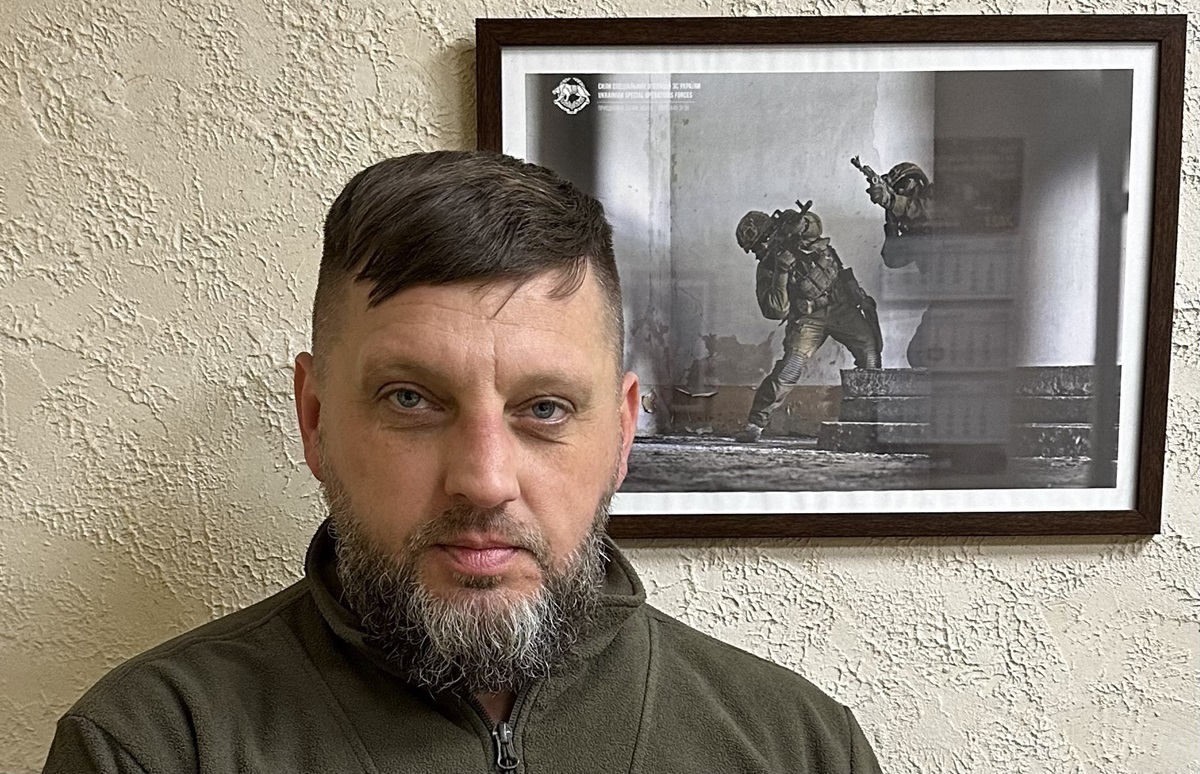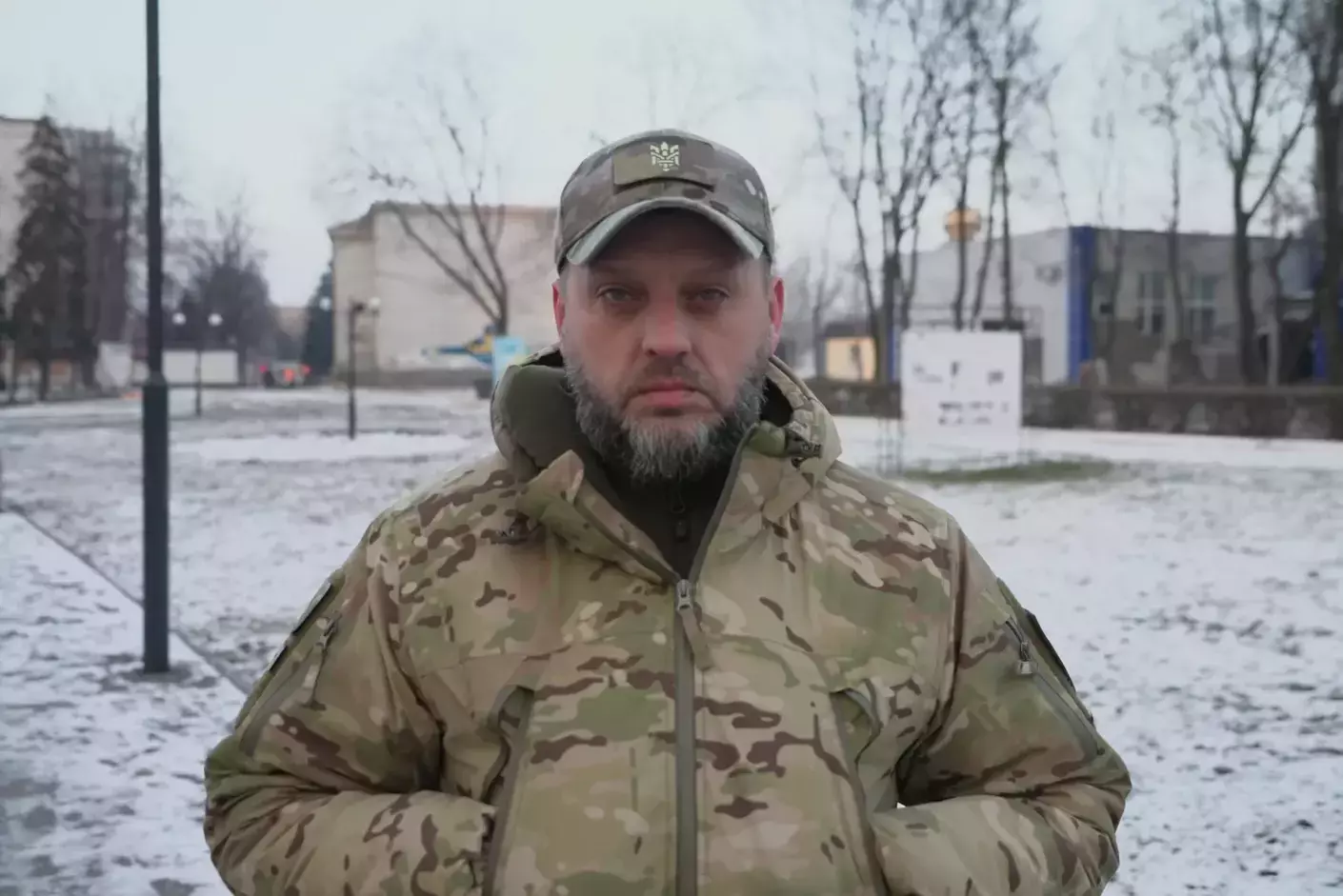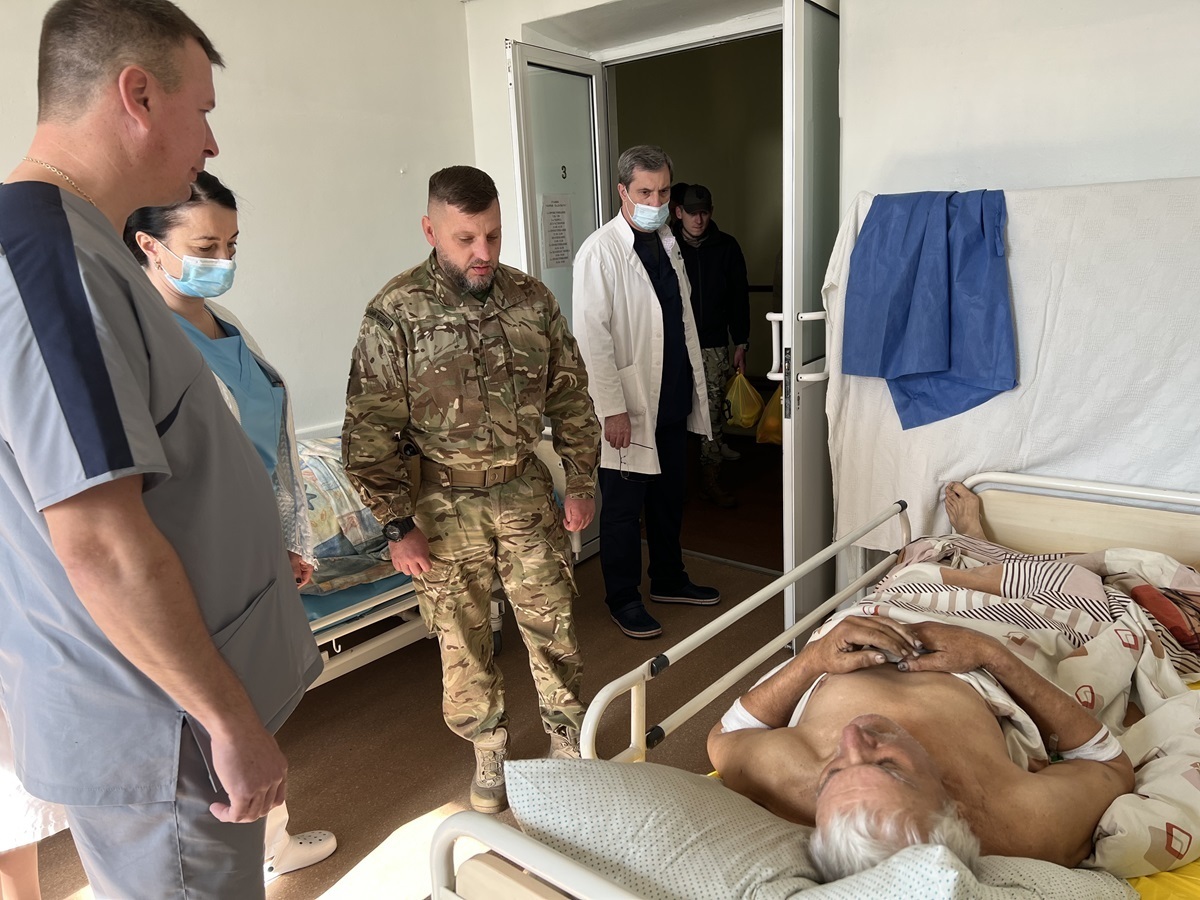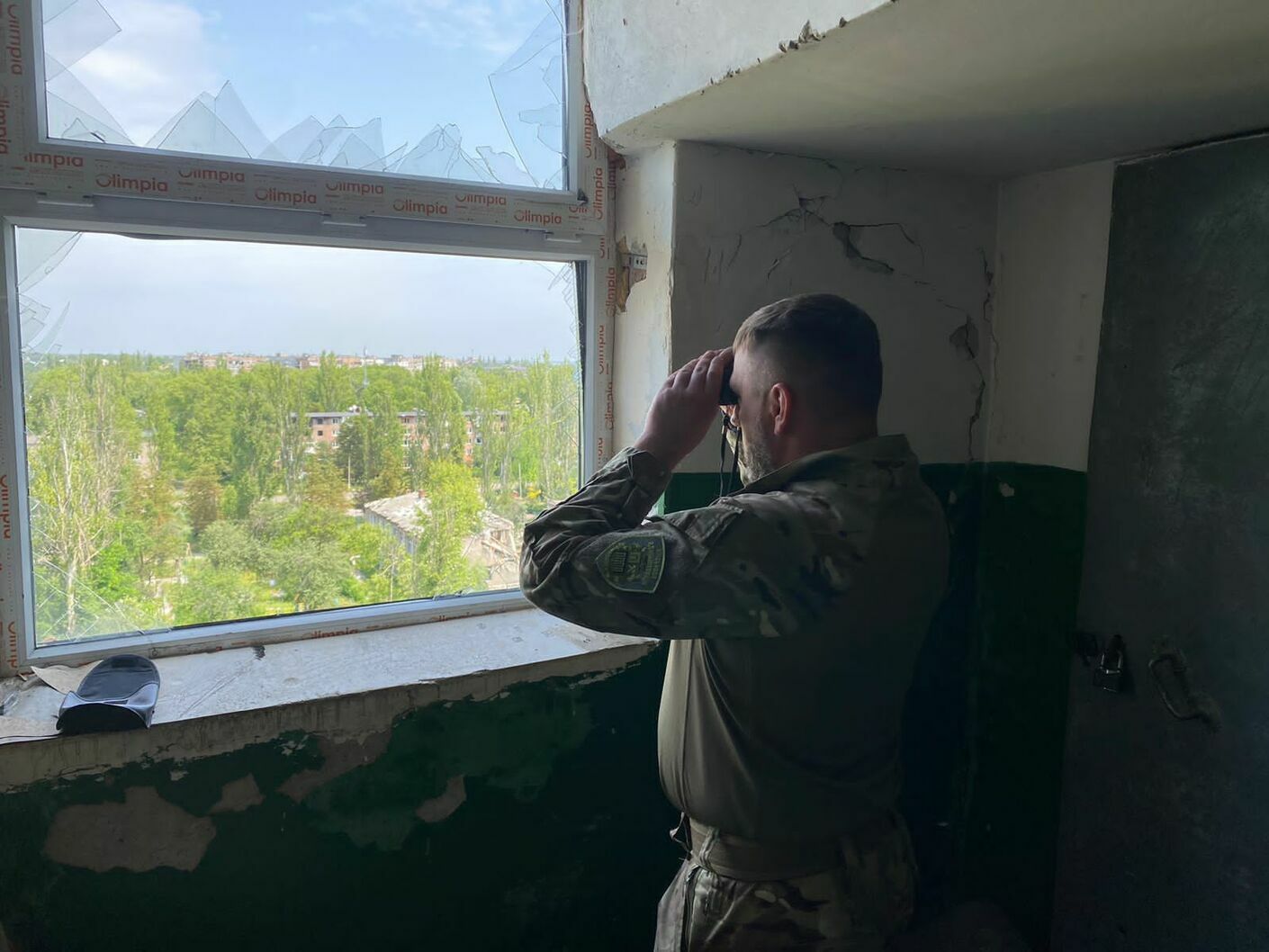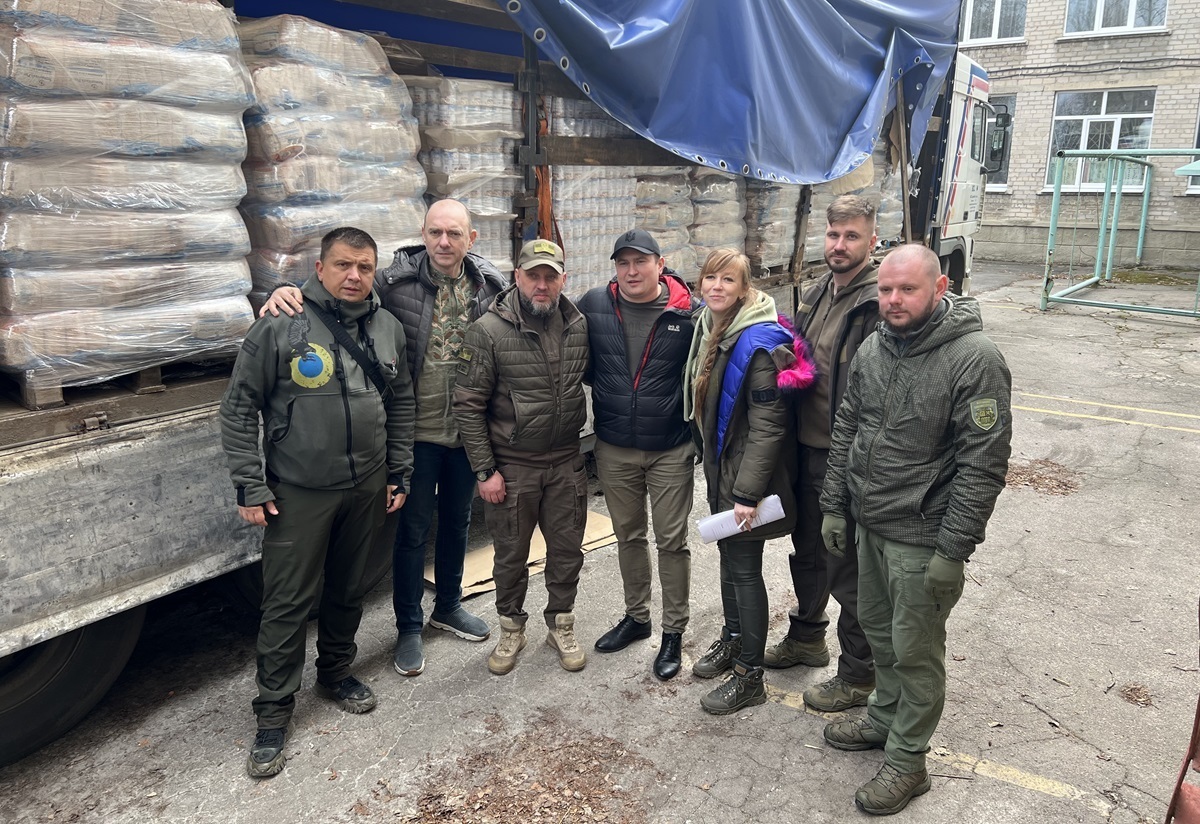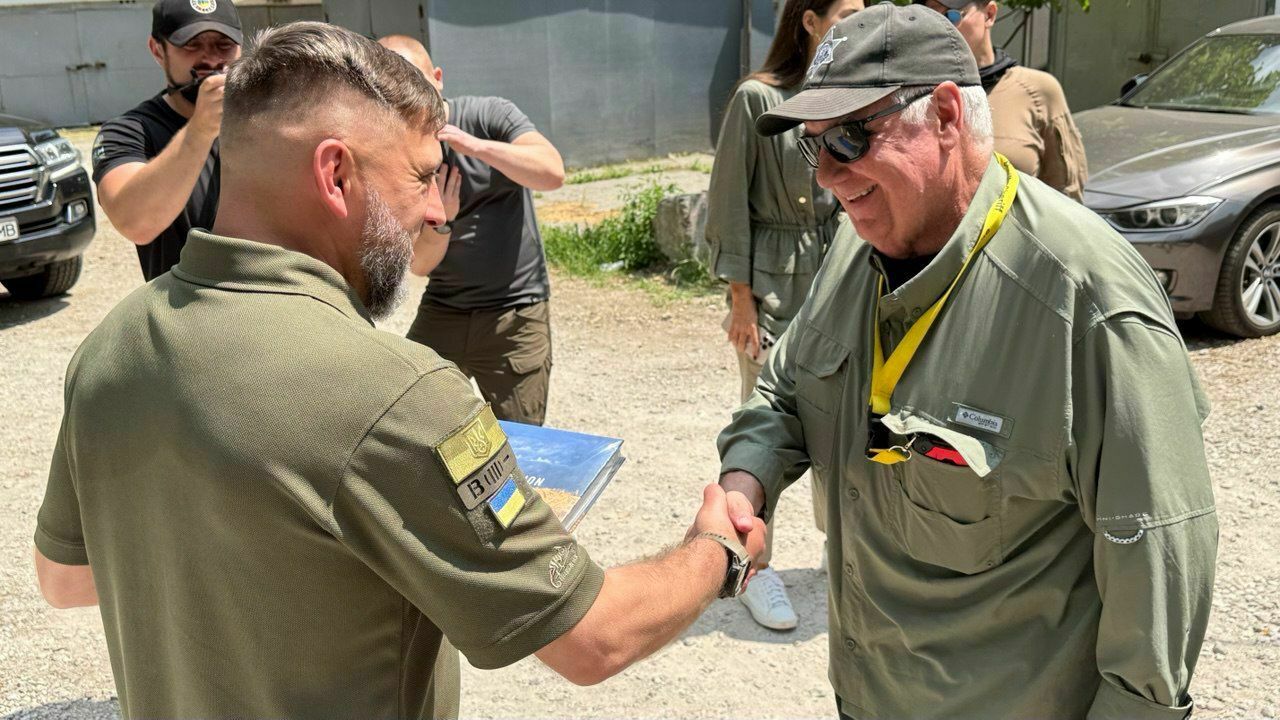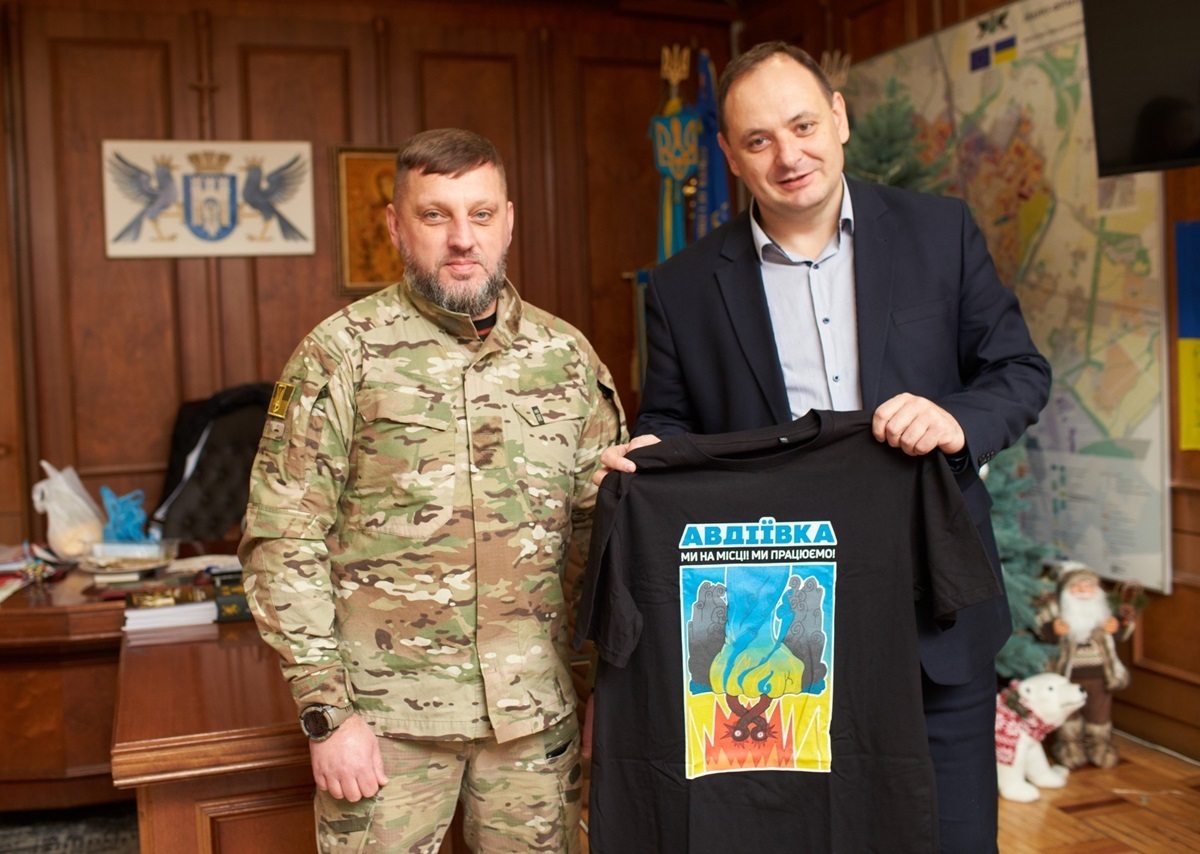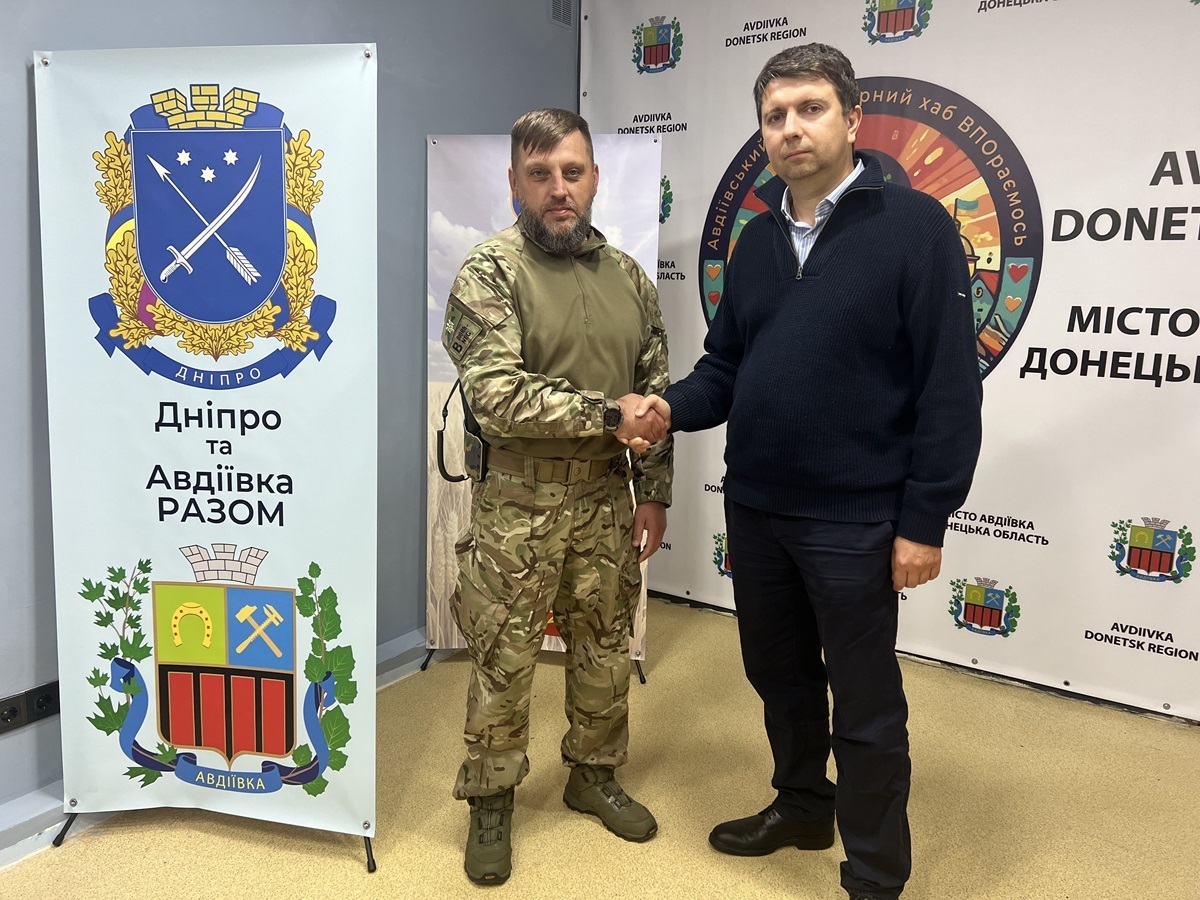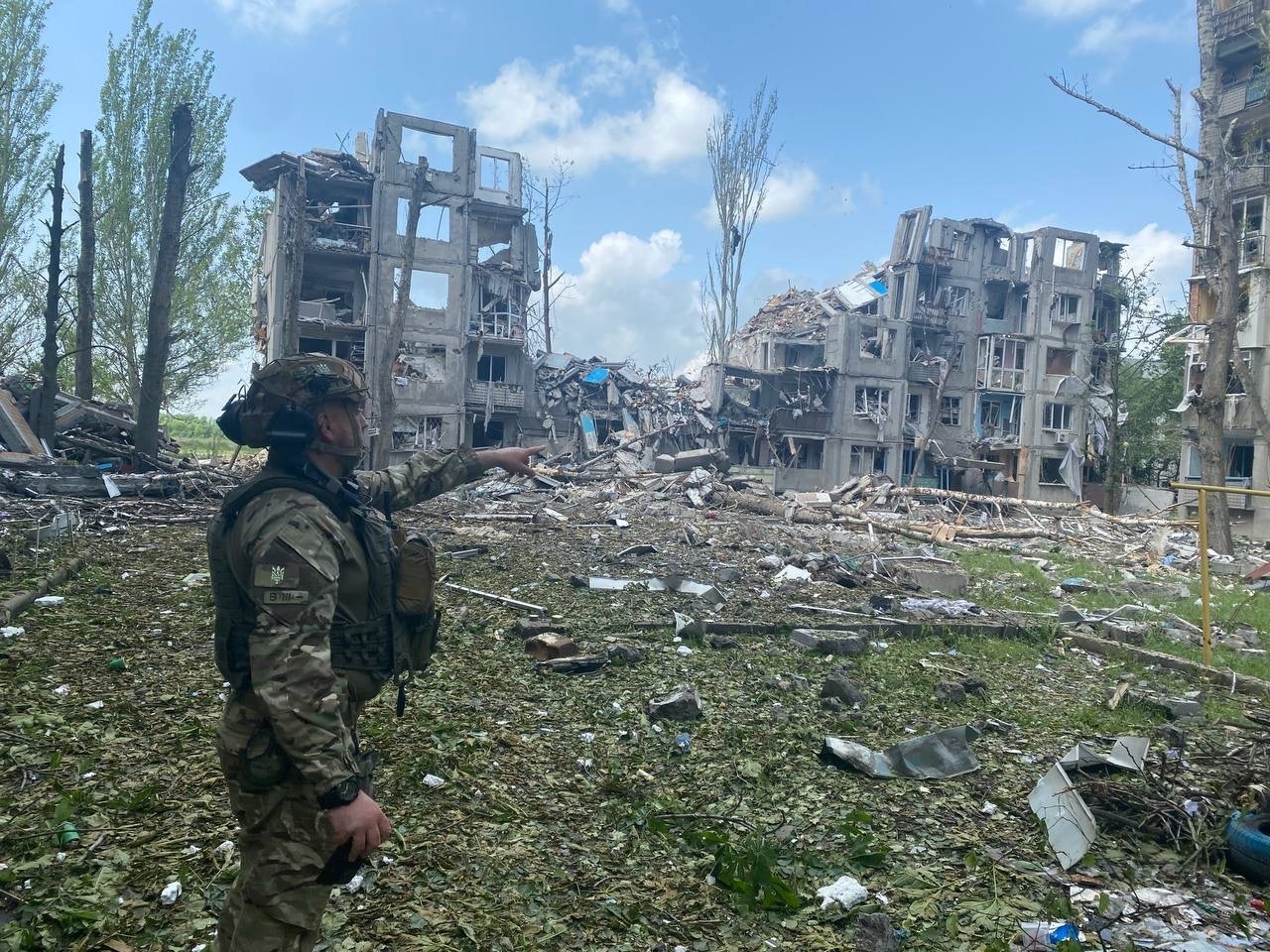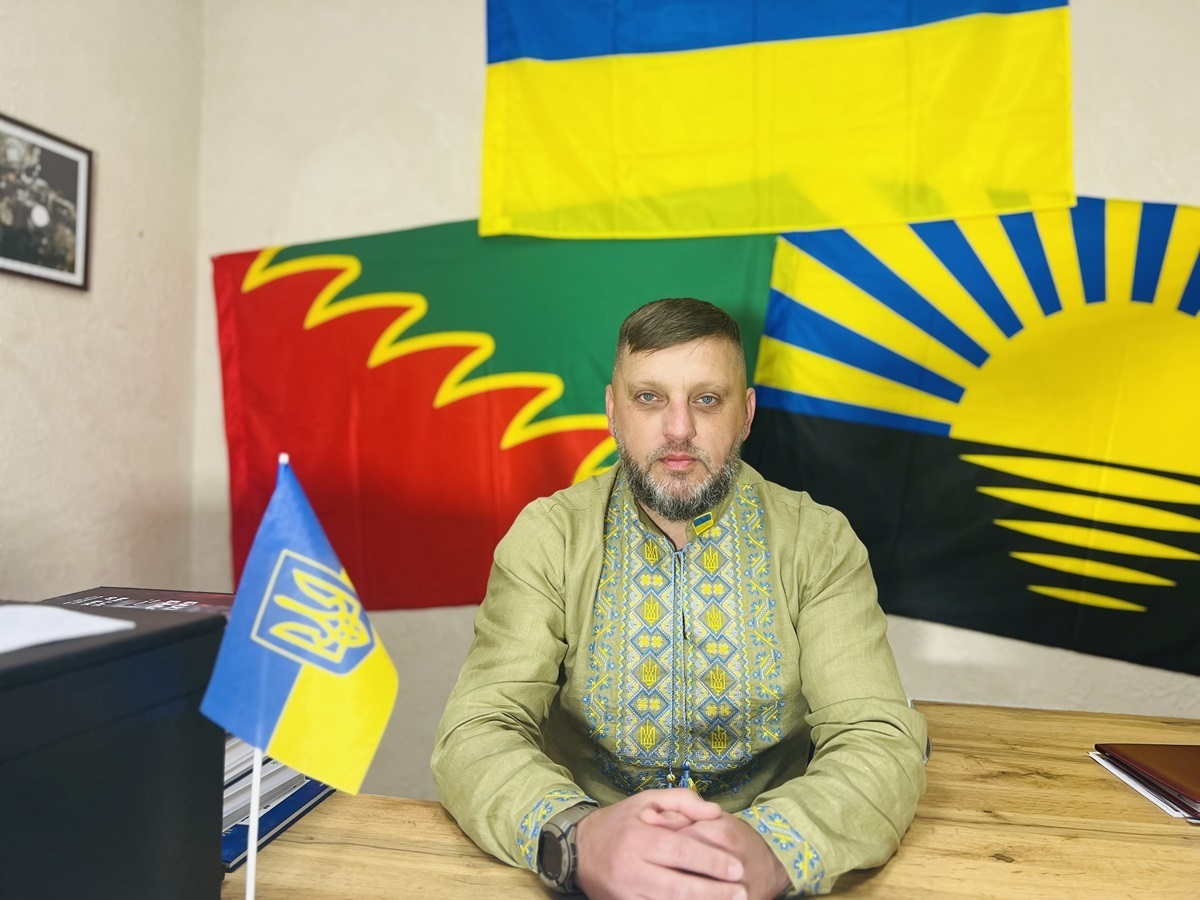Undefeated outpost of the Donetsk region: Life under fire in Avdiivka
Residents of the occupied Avdiivka community are trying to settle together and not lose their identity in the hope of returning home.
By Dmytro Syniak
Five months ago, Vitalii Barabash, Head of the Avdiivka Military Administration, submitted a report asking to leave his post and go to the front. This was his second request since the large-scale invasion began. ‘There is less and less work here, and I am an officer with combat experience,’ he explains briefly. He served his conscript service in 1996–1997 and volunteered for the frontline in 2014, soon ending up in the midst of the fighting in Avdiivka’s ‘industrial zone’, at the Donetsk airport, and in Pisky and Mariinka. Mr Barabash fought with interruptions until 2016, when he was wounded and retired.
Then he entered politics. From 2012 to 2019, he was a head of the Donetsk city branch of a public organisation, a head of the Donetsk regional organisation of a political party, an advisor to the chief of staff of the Verkhovna Rada of Ukraine, and an assistant to MPs.
Vitalii Barabash earned two degrees. He graduated from Donetsk National University of Economics and Trade with a degree in Food and Processing Industries, and from Mariupol State University with a degree in Public Administration and Management. Mr Barabash also has business experience, having been involved in consulting on commercial activities and management, as well as the construction of residential and non-residential buildings and furniture production.
This unique and versatile experience made him the ideal candidate to lead a community ‘on the border with war’. On 25 May 2020, Vitalii Barabash, a junior reserve lieutenant and father of three, signed a contract with the Ukrainian Armed Forces, and on 1 June, he became the head of the military-civilian administration of Avdiivka. In this position, he was mainly involved in community development until 24 February 2022 and then in the community’s defence until 17 February 2024. When the community was completely occupied, he took care of its residents who had been evacuated to different parts of Ukraine. Mr Barabash spoke to Decentralisation about his work and his vision for the future of Avdiivka.
Vitalii Barabash, Head of the Avdiivka Military Administration of the Donetsk region
Community leader who voluntarily joins the army
Why did you decide to join the army? Please explain in more detail.
I immediately wrote a report as soon as Avdiivka was fully occupied. By that time, we had already removed all our valuables and settled our departments in their offices. However, I was told, ‘It is not the right time! Get busy building fortifications!’ And I did. Now, though, there is less and less work to be done, and there are not enough officers at the front. So, my decision was made naturally. With my combat, managerial and administrative experience, I can be of great use to the army. I think that is where I belong. My comrades from the Special Operations Forces have been waiting for me for a long time. Everything has been agreed: I have passed all the necessary tests, including a polygraph.
To whom will you hand the Avdiivka Military Administration over? Are you not afraid that work will stop without you?
Not at all! I have a great team and professional deputies. I think one of them will take my place. When the city was thriving and developing, there was plenty of work to be done, ranging from economic activities and the communal sphere to international contacts. Now, however, there is little of this left, and only a third of the former team – around thirty people – are still working. Most of the other employees are on temporary layoff, receiving two-thirds of their salary. Salaries in a local government are generally very low. Many do not even reach the level of the minimum wage. This is because there are no bonuses or additional payments for length of service during temporary layoff.
Is an occupied community really manageable by just thirty people?
Yes, it is. After all, we still have several departments: education, social protection, children’s affairs, veterans’ policy, healthcare. There is also a general department that works with mobilisation resources, and an economic department with three specialists. This is still a lot: some departments have only one person left. But there is no need for more.
What have you been doing since the enemy occupied the Avdiivka community?
Mostly building fortifications, first in the Pokrovsk district and then in the Kramatorsk district. My experience of managing communal facilities and my military background were useful here. The Avdiivka administration is now based in Dnipro, meaning that I lived in the Kramatorsk-Dnipro-Pokrovsk area for the past year. Avdiivka was also previously part of this group...
What are your responsibilities as the head of the Avdiivka Military Administration?
I ensure the smooth running of the remaining departments and the care for our residents who have temporarily relocated from Avdiivka. They must receive the necessary documents and social and humanitarian aid. Unfortunately, there is less and less humanitarian aid available now as it is becoming harder to find. When our city was heroically defending itself and the world’s attention was focused on it, there was a constant stream of people eager to help. Now, as they say, ‘priorities have changed’. For some reason, donors have decided that the residents of the Avdiivka community are now happily living in new peaceful cities and villages and do not need any help. Unfortunately, this is not the case. Our displaced people, who are often not needed in their new regions of Ukraine, face many problems, from having nothing to eat to having nowhere to live.
Vitalii Barabash in Pokrovsk, Donetsk region. March 2024
Vitalii Barabash visiting a wounded Ukrainian in hospital
Avdiivka, 2023. Vitalii Barabash inspecting the area from a high-rise building
Jobs and housing for residents of Avdiivka
Can the Avdiivka Military Administration provide its residents with jobs and housing?
Of course, we cannot always solve all the problems of the people who contact us, but we can solve most of them. The fact that the residents of Avdiivka mostly support each other makes this task easier. For example, almost 5,000 of our residents are in Kamianske, 2,200 are in Dnipro, almost 2,000 are in Kyiv, almost 1,000 are in Brovary, and the same number are in Boryspil. Several hundred of our residents have settled in Stryi and Ivano-Frankivsk. When we receive ‘distress signals’ from them, we go to the relevant place and I personally meet with the mayors. Together, we try to find the right solution, discuss the nuances of the problems, connect our social security departments, and reach out to local NGOs. In fact, all we need to do is to start certain processes, bring the right people together, sometimes sign contracts, and we can find both housing and work. Unfortunately, none of this is done systematically; it is all done manually and relies on personal contacts. I am honest about it.
The situation with housing is more or less clear: city councils can find some premises for dormitories. But how do they find jobs for IDPs? Only through the local employment service?
First of all, the employment service is, of course, involved. However, we also handle certain matters centrally. For example, there is the agreement that our military administration signed with Ukrposhta. However, a lot of this also depends on personal contacts. Yesterday, for instance, I accompanied Ihor Smelianskyi, CEO of Ukrposhta, on his working trip to the frontline communities in the Donetsk region. Thanks to our collaboration, we have signed two agreements with Ukrposhta: one to deliver humanitarian goods to the Avdiivka community at a significant discount, and another to hire our employees. Ukrposhta has offices all over the country and always looks for staff. So, we first submit the lists of our people to the head office, and then the Ukrposhta HR team calls and informs us about vacancies in certain cities and villages. We share this information in our social media groups, and interested candidates respond… This is how we have already employed 50–60 of our residents. This may seem like an insignificant number, but it is significant because we are talking about people’s lives.
Do you keep in touch with international organisations to help people who have fled Avdiivka?
Yes, we do. We communicate with everyone, but unfortunately most programmes have already closed. At the moment, we receive around 90 per cent of our aid from the GEM (Global Empowerment Mission). The foundation’s main sponsor is billionaire Warren Buffett. His son, Howard Buffett, visited us in 2023. We met with him again in Dnipro a month and a half ago. I think the flow of assistance from him never stopped precisely because we communicated with him a lot in person and became friends, so to speak.
Avdiivka was essentially a city of one enterprise: a coke plant where it seemed that every second resident worked. Did the plant’s specialists find work at similar Ukrainian enterprises?
In fact, I also personally negotiated this with Oleksandr Vilkul, Mayor of Kryvyi Rih, and Andrii Bilousov, Mayor of Kamianske. Several metallurgical enterprises are located in Kamianske, and Kryvyi Rih is well known throughout the country. I am convinced that the case just needs to be pushed forward. When social security departments, NGOs from different communities and so on cooperate with each other, things move forward.
The International Humanitarian Centre and the Sky of Ukraine Charitable Foundation delivering humanitarian aid to the Avdiivka community: 20 tonnes of food, bandages, sleeping bags, flashlights, trench candles and a large generator
Vitalii Barabash (left) and Howard Buffett, US businessman and philanthropist, middle son of billionaire Warren Buffett, founder of The Howard G. Buffett Foundation
Global Empowerment Mission Ukraine (GEM) in partnership with The Howard G. Buffett Foundation handed over generators to the Avdiivka community
Vitalii Barabash and Ruslan Martsynkiv, Mayor of Ivano-Frankivsk
Vitalii Barabash and Oleksandr Sanzhara, Secretary of Dnipro City Council
Why should relocated hospitals and schools not be closed?
You did not mention the education department. What is it doing now?
Of course, the number of students has decreased, as has the workload of the education department. Before the outbreak of the full-scale war, there were around 2,200 children in the Avdiivka community; by 2024, this figure had fallen to 1,500, and it has now dropped further to 1,200. We have closed two out of five schools; three are still operating online. Despite this, there is no shortage of first-graders. I think two schools will each have one first grade this year and the third will have two. I personally meet with the graduates, and I am very pleased with their level of knowledge. Our schools are constantly recognised even at regional level. One of our graduates scored 200 points in mathematics in this year’s National Multisubject Test! Another area for the education department to work on is ensuring that transfers from our online school to local offline schools are organised correctly and efficiently.
Would it make sense to merge these three schools to save money?
Firstly, it is very difficult to implement administratively. Secondly, we have already closed two schools. It would be wrong to create an online school with six hundred students, which is exactly what would happen if we closed another of our schools. The burden on teachers would be too great. If the number of children drops to 900, however, then we can consider it.
Is the situation the same in the healthcare sector? Are you gradually reducing it, too? Where has the Avdiivka hospital been relocated to, and how is it doing there?
Our hospital is now operating in the Obolon district of Kyiv. Although most of our service packages have been cut, the hospital is managing to survive. In my opinion, funding for hospitals like ours should not be limited. You cannot simply destroy them. Yet this is exactly what is happening. Our reserves are already running out and people do not know what to do next. We advise them to look for a new job, but they do not want to leave the hospital, which has been and remains a part of their lives. We have already held several staff meetings in which we proposed closing the hospital. But people say, ‘We do not want to go anywhere; we want to work here!’ How can we refuse them? So, no matter how hard it is, we are supporting this institution with all our resources.
In his interview for Decentralisation, Pavlo Kuzmenko, Mayor of Okhtyrka, called the relocation of hospitals, educational institutions and local governments from the occupied territories a destructive phenomenon. It turns out that, although there is a shortage of teachers at the Okhtyrka school, several relocated schools are operating online in the city and most of the children who study at these schools also live in Okhtyrka. This situation is not normal, is it?
I agree. Everything you said seems logical and correct. (By the way, I know Pavlo Kuzmenko personally and he told me about these ideas himself). However, there is one problem. If we want to follow his advice and close the locked-down schools and hospitals, we must first inform all their employees, students, and patients. ‘There will be no going back. The occupied territories will remain occupied, at least for the foreseeable future.’ I do not know who in power could deliver this message now. But the strategy depends on it. If we want to be able to return to Avdiivka in a few years’ time, we must keep our workforce together. Otherwise, yes, it is better to disband them. But tell me, are we definitely not going to return? Another point should also be considered. For example, it is far from certain that a teacher from an Avdiivka school would want to work in Kyiv. In fact, I think it is much more likely that she will go abroad. Finally, the third point. Our hospitals and schools are part of our identity. For example, our hospital now has a very professional laboratory manager, a mega-professional. Many attempts have been made to lure her to private and public clinics in Kyiv. She tells me sincerely, ‘Stepanovych, it is not about Kyiv. I can easily find a job abroad and earn a completely different salary!’ But she refuses to go abroad; she is a patriot of Avdiivka and working at the Avdiivka hospital is her way of staying true to herself. There are many people like her. So, although I myself repeatedly stuck to my guns, so to speak, and said: ‘That is it! We are closing the hospital!’, I was later forced to change my mind due to pressure from the public.
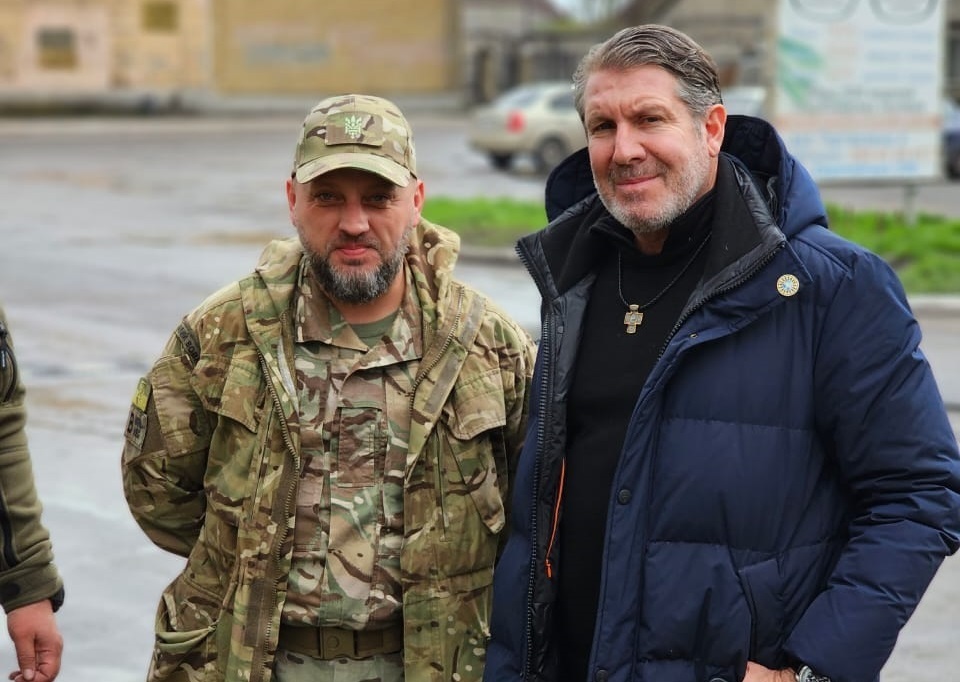
Vitalii Barabash and Michael Capponi, founder and president of the Global Empowerment Mission (GEM), which is currently providing basic food packages to residents of Avdiivka
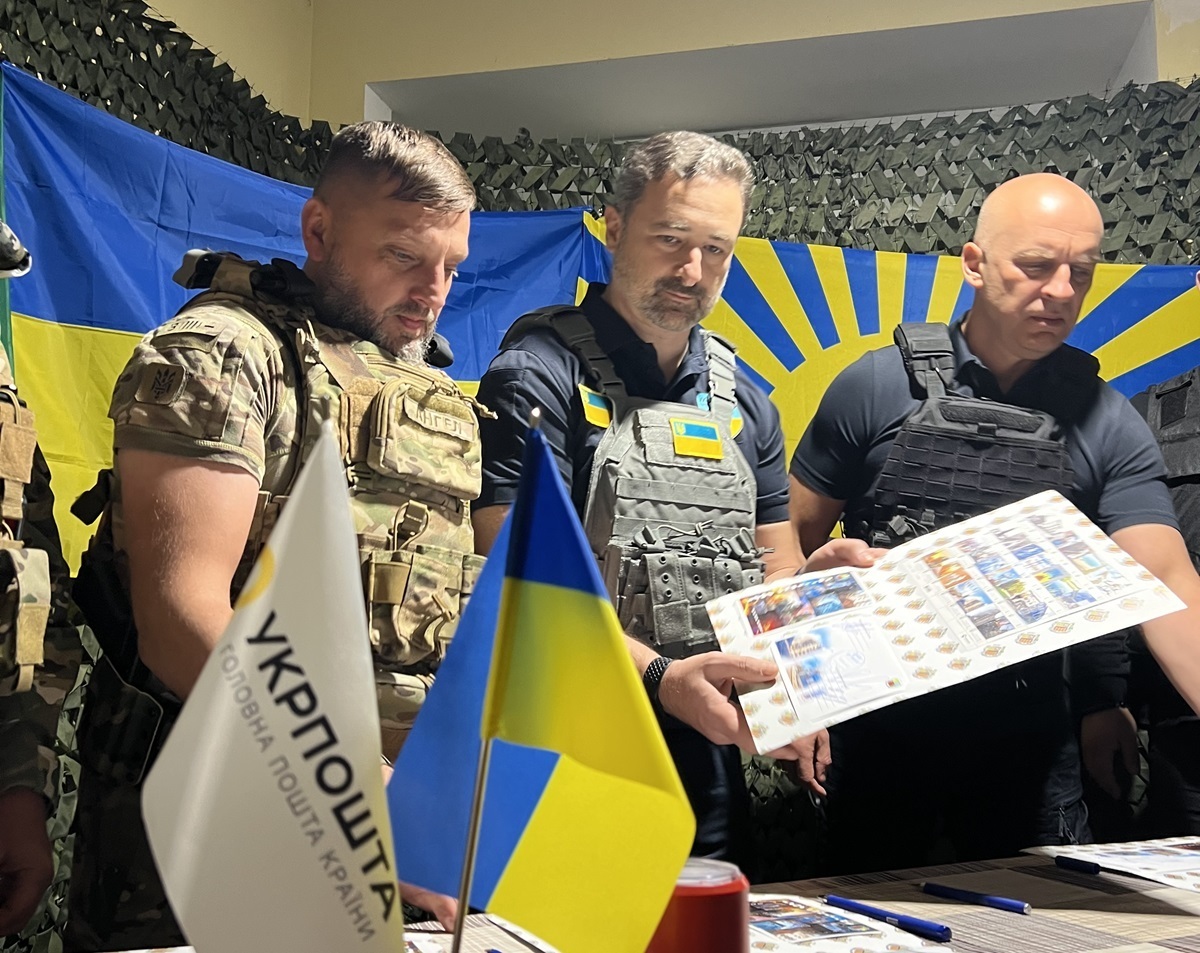
During the ceremonial redemption of the stamp issued in honour of the 245th anniversary of the founding of Avdiivka. The stamp was designed specially for this date by the Avdiivka City Military Administration and the NGO Promin IF in cooperation with Ukrposhta. From left: Vitalii Barabash, Head of the Avdiivka Military Administration, Ihor Smelianskyi, CEO of Ukrposhta, and Vadym Filashkin, Head of the Donetsk Regional State Administration – Head of the Donetsk Regional Military-Civilian Administration. Avdiivka, 9 September 2023
News from occupied Avdiivka
What news do you hear from occupied Avdiivka, from the other side?
De-Ukrainisation is in full swing there. Just today, journalist Natalia Tarchevska published her fourth article about the people of Avdiivka on her Telegram channel. It is about those who welcome the ‘Russian world’. The story also contains information about the renaming of streets. Avdiivka will now have Lenin and Chapaev streets again. It is a return to the bright socialist past.
Are the occupiers rebuilding the city?
There is no reconstruction as such, everything is done only for the TV reports. For example, the Russians have repaired two more or less preserved apartment blocks and are constantly shuffling people around like cards. They settled one family and told them: ‘You are not allowed to change anything in the apartment!’ In other words, not even an air conditioner or a picture can be installed. Two months later, the family is told to move out and a new family is moved in, and the process is filmed again. This gives viewers the impression that the city is recovering rapidly. But you cannot fool the locals! We have a house at 73 Soborna Street, built from white saltpeter bricks. It is the only one of its kind in the city – everyone knows that. When hundreds of families ‘move in’, and the reporters try to film the house from different angles to confuse the audience, the locals just laugh.
Are these renovated houses connected to the gas, water and electricity supplies?
No, they are not. Instead, Russian TV regularly reports on how well things are going in Avdiivka. When the film crew arrives, they start a diesel generator, providing the houses with electricity, heat, and water pumped from artesian wells. However, when the film crew leaves, the generator is turned off and the ‘fairy tale’ ends. There is no more light, no more water, and no more heat.
Are there any local residents still living in Avdiivka? Are those who left for Russia coming back?
In several cases, the real owners of the apartments, who had previously been hiding in Russia or ‘deeneriia’, came to their renovated houses. What do you think they were told? That their ‘ukrop’ documents were no longer valid and that they had to take them to the ‘ukrop’ office. At the time of the city’s occupation, about 700 people were still there. Now, as far as we know, only about three hundred remain. However, new people are brought to Avdiivka and then resettled elsewhere. So, there is a certain amount of traffic there all the time. The centre of life is now the two houses I mentioned. Recently, a third house was added because people started to express outrage: if you count the number of stories about tenants moving into these two houses, it turns out that roughly 200 families have moved into the apartment block in two years. To change this situation, it was decided to repair another building. The invaders have also recently started rebuilding the city administration building. How could they not? The authorities have to be located somewhere!
In your previous interview for Decentralisation, you stated that the level of destruction in Avdiivka was approaching that in Bakhmut. Does that mean the entire city is still in ruins? What about the Avdiivka Coke Plant?
Yes, everything is in ruins except for a few houses. The coke plant is also being dismantled. First, they removed the non-ferrous metals and now they have started removing the ferrous metals. They work during the day and transport the metals away at night, so people do not notice how many trucks leave the coke plant. Expensive, unique equipment is simply being cut up into scrap metal.
Do residents of Avdiivka receive housing certificates under the eRestoration programme?
No, they do not. According to the law, such certificates can only be issued to people whose homes are located close to the active hostilities zone. A special commission must first examine the damage to the housing and then determine the cost of the damage before issuing the certificate. Clearly, this is impossible in an occupied territory. There was a pilot project in Melitopol, where, if I recall correctly, ten households received compensation from international donors. But that was an isolated case. I fully understand that no amount of money would be enough to compensate everyone who lived in the occupied territories before the full-scale invasion. I am as homeless as anyone else. My parents’ house near Avdiivka, where I was born, is located in the territory that is now occupied. My mum, sister, brother and other relatives keep asking me if they will ever receive compensation for it, but I have no answer for them yet. I tell everyone, ‘Let’s wait.’
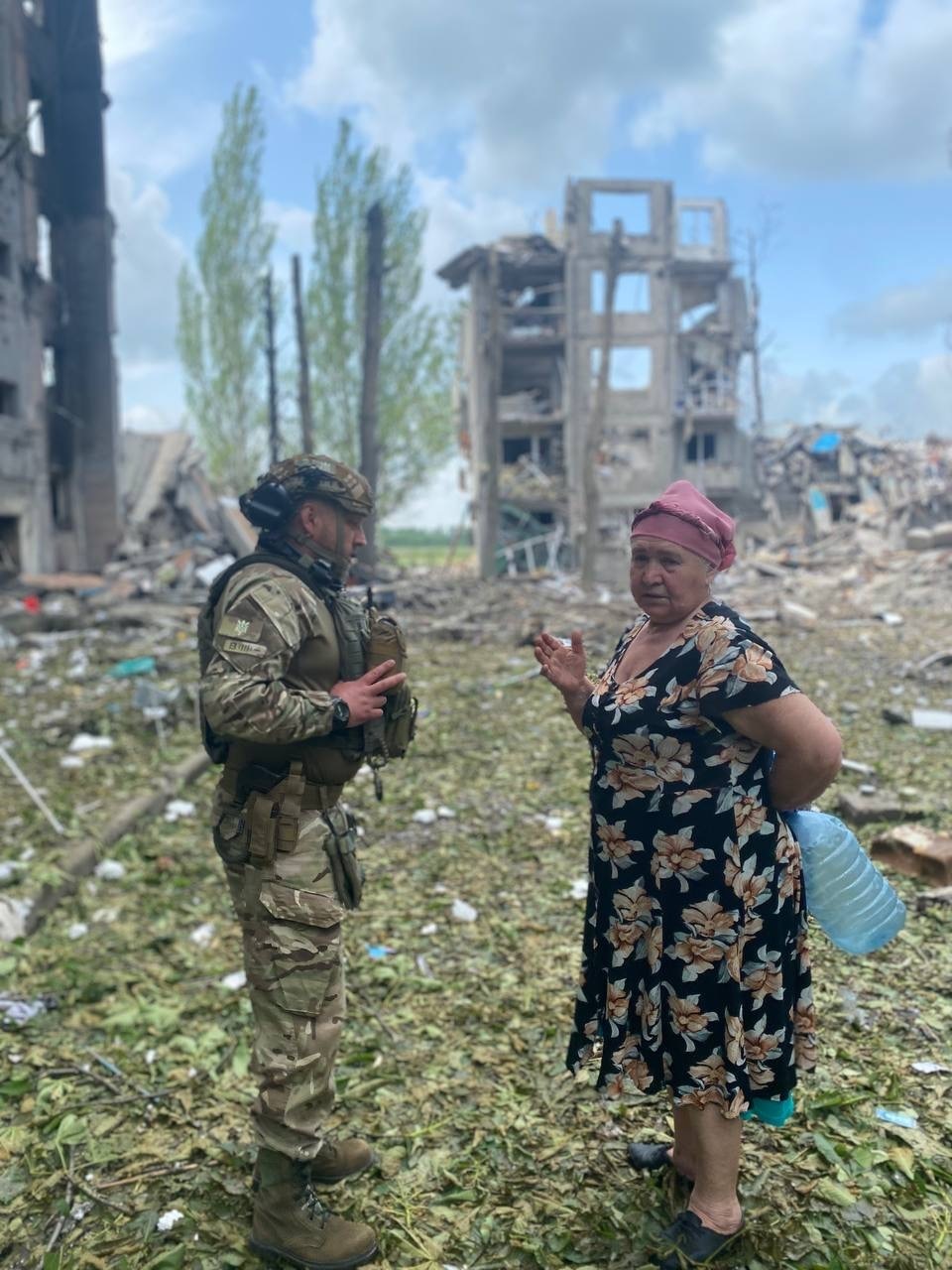 |
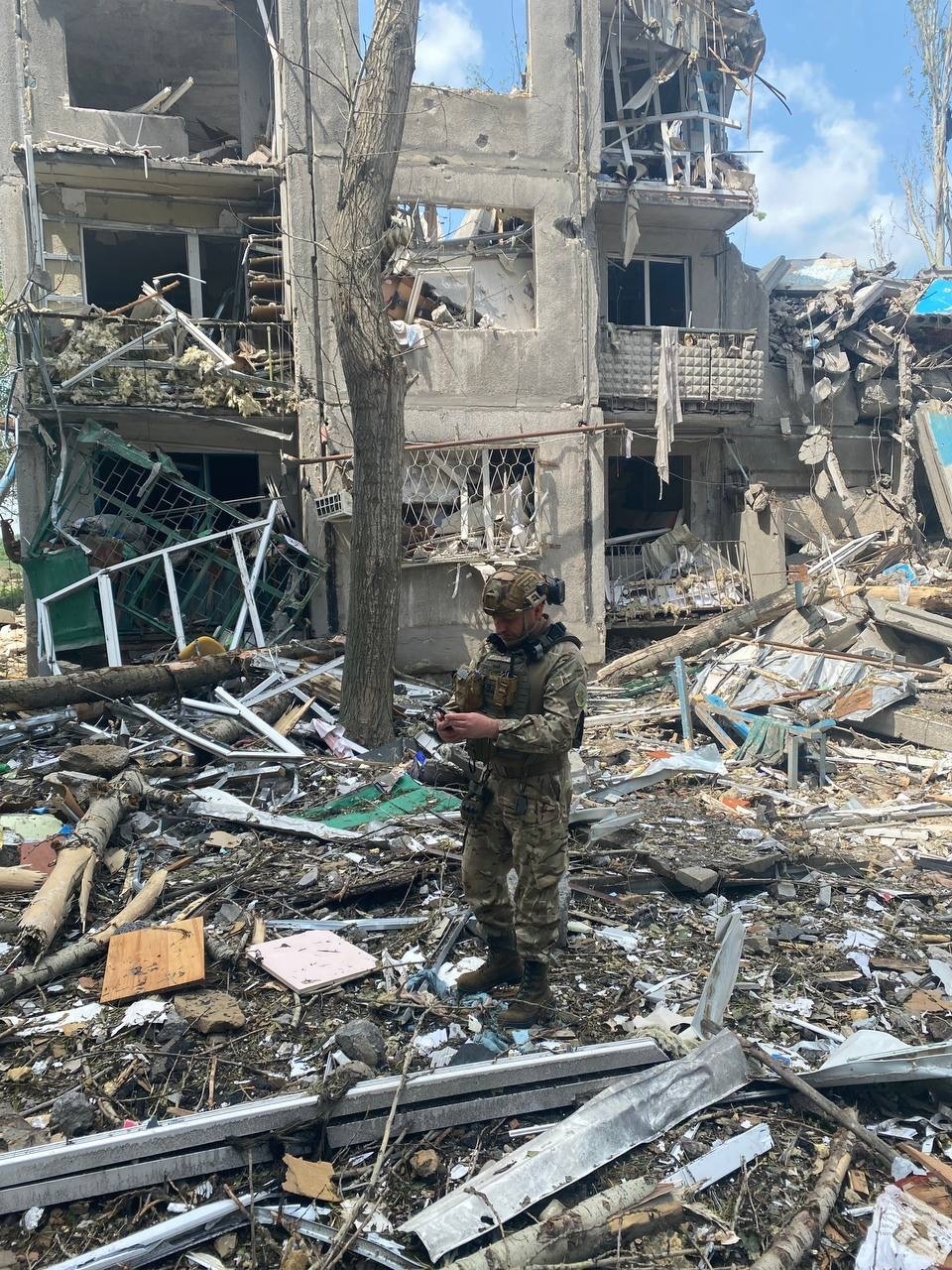 |
Vitalii Barabash in Avdiivka. May 2023
Vitalii Barabash in his office. The Avdiivka city flag is on the left behind him and the Donetsk region flag is on the right
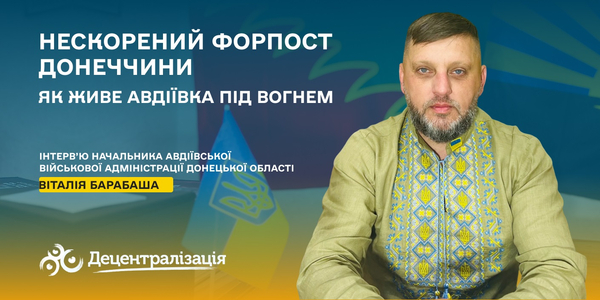
Tags:
war stories war stories special project report
Область:
Донецька областьГромади:
Авдіївська територіальна громадаSource:
Decentralization portal
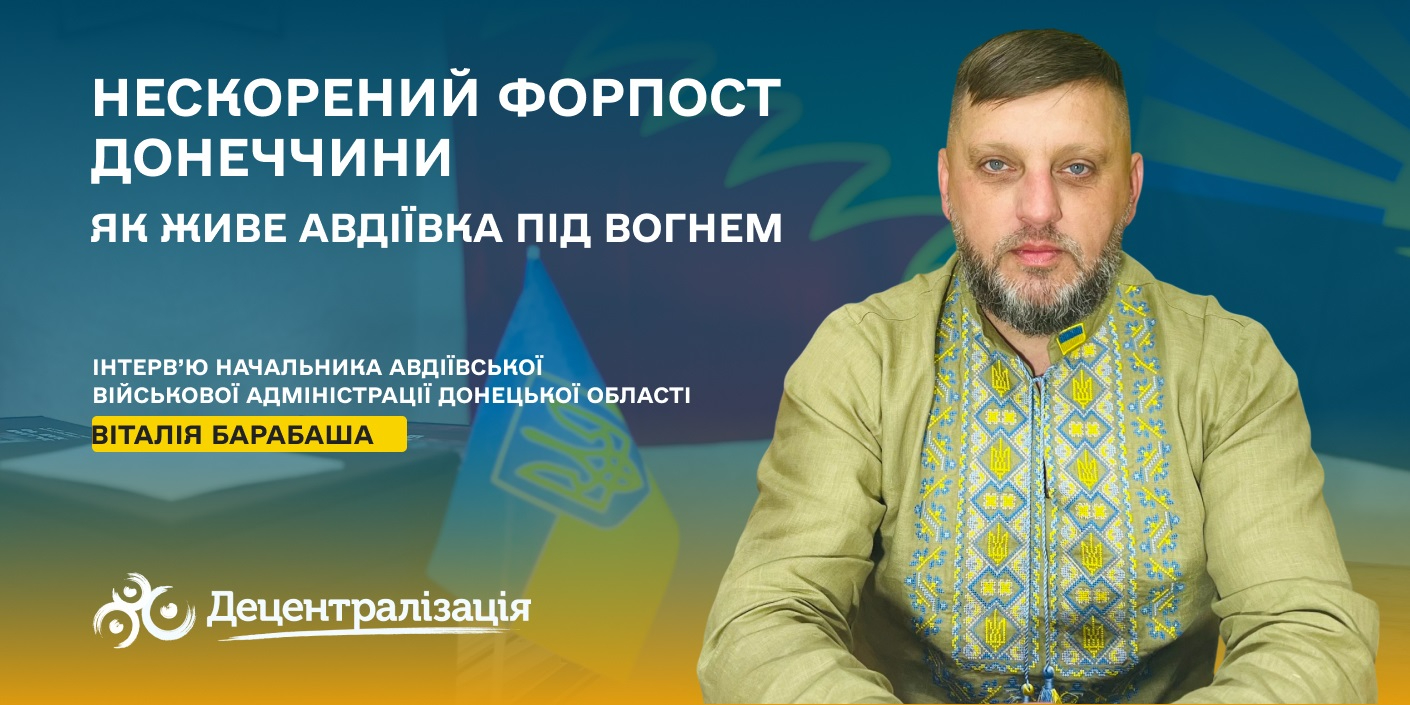
04 March 2026
Львівська агломерація і Метрополія Ґетеборгу (Швеція) заклали основу для довгострокового партнерства
Львівська агломерація і Метрополія Ґетеборгу...
Перспектива розвитку метрополій, які у нас більш звично називати агломераціями, останнім часом привертає до себе все...
04 March 2026
Кращі практики на старті: як Центри...
Старт нових сервісів психосоціальної підтримки в умовах війни завжди є викликом. Обмежені ресурси, інфраструктурні...
04 March 2026
Helvetas проводить відбір ТГ Харківської області для забезпечення мешканців житлом
Helvetas проводить відбір ТГ Харківської...
В межах проєкту «Horizon Homes: сталий модульний житловий проєкт в Україні», що впроваджується швейцарською...
04 March 2026
Snihurivka signs its first partnership agreement with Danish municipality of Gentofte
Snihurivka signs its first partnership...
Snihurivka urban community is launching a new stage of international cooperation. Ivan Kukhta, Head of the Snihurivka...
